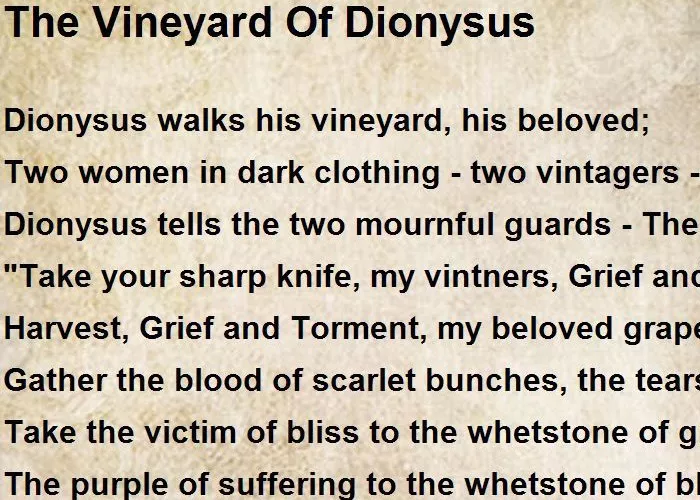Welcome to Poem of the Day – The Vineyard of Dionysus by Vyacheslav Ivanovich Ivanov.
The Vineyard of Dionysus by Vyacheslav Ivanovich Ivanov stands as a captivating work of Russian Symbolism, showcasing the poet‘s intricate exploration of themes surrounding mythology, human nature, and the divine. Written during a period of significant cultural change and intellectual ferment in Russia, the poem is a profound reflection of Ivanov’s philosophical and artistic vision. Through a delicate interplay of symbolism and allusion, Ivanov channels the figure of Dionysus—ancient Greece’s god of wine, ecstasy, and unrestrained emotion—as both a literal and metaphorical force.
The Vineyard Of Dionysus Poem
Dionysus walks his vineyard, his beloved;
Two women in dark clothing – two vintagers – follow him.
Dionysus tells the two mournful guards – The vintagers:
“Take your sharp knife, my vintners, Grief and Torment;
Harvest, Grief and Torment, my beloved grapes!
Gather the blood of scarlet bunches, the tears of my golden clusters –
Take the victim of bliss to the whetstone of grief,
The purple of suffering to the whetstone of bliss;
Pour the fervent liquid of scarlet delights into my ardent Grail!”
The Vineyard Of Dionysus Poem Explanation
Vyacheslav Ivanov, a leading figure in Russian Symbolism, engaged with the classical tradition in a unique way, drawing on ancient myths, esoteric teachings, and philosophical inquiry. The Vineyard of Dionysus is a poem that not only addresses the myth of Dionysus but also uses it as a vehicle for discussing broader existential questions. The work is dense, philosophical, and multilayered, offering rich imagery that invites deep interpretation.
Dionysus as a Symbol of the Sublime and the Chaotic
At the heart of The Vineyard of Dionysus is the image of Dionysus himself, a figure who embodies both divine intoxication and the destructive, liberating force of nature. As the god of wine and revelry, Dionysus represents the freedom of the senses and the transcendence of societal norms. However, Ivanov’s portrayal is more complex than a mere celebration of hedonism. The vineyard, a symbol of the god’s domain, becomes a place where the boundaries between the sacred and the profane blur.
Ivanov’s use of Dionysus serves as a way to engage with the tension between rational order and chaotic freedom. Dionysus’ very essence is the subversion of established forms—he challenges the established rules of society, and this spirit resonates throughout the poem. Ivanov contrasts the god’s world of wild abandon with the intellectual and spiritual constraints of modern existence. The vineyard, with its endless rows of grapevines, suggests both fertility and potential destruction. It is a fertile ground for spiritual awakening but also a place where the revelry could lead to madness, violence, or collapse.
The Spiritual and Existential Dimension
As a Symbolist, Ivanov’s work is steeped in metaphysical inquiry. The Vineyard of Dionysus is not merely a reflection on the mythological god but also an exploration of the larger themes of existence, ecstasy, and the search for higher meaning. Dionysus’ vineyards symbolize a realm where human desires, in their most raw and unfiltered form, meet the divine. The god represents the paradox of existence: the tension between the human quest for meaning and the inevitable surrender to forces beyond our control.
Through the metaphor of the vineyard, Ivanov delves into the complexities of human consciousness, suggesting that the human soul is akin to the vines in the vineyard—both bound to the earth and yet capable of reaching toward the heavens. The wine that is harvested from the vineyard can be seen as a symbol of the fruit of knowledge and experience—one that intoxicates and enlightens simultaneously. But it is also a reminder of the dangers of unchecked passion and the potential for spiritual disarray when the pursuit of the divine becomes too entangled with human desires.
The Poetic Form and Symbolism
Ivanov’s use of language in The Vineyard of Dionysus is rich in symbolism. Every image, from the lush vineyards to the figure of Dionysus himself, is charged with multiple layers of meaning. His language evokes a sense of mystery, drawing on both classical references and modern philosophical ideas. The structure of the poem mirrors the cyclical nature of life and death, much like the endless cycles of wine-making. The repetitive, almost incantatory quality of the verses echoes the theme of cyclical rebirth, where destruction and creation are inextricably linked.
The poem’s lush imagery and allusions to the classical world reflect Ivanov’s deep engagement with the philosophical undercurrents of the Symbolist movement. His careful crafting of the text invites the reader to interpret the poem not just as a narrative but as a meditation on life’s deeper, often paradoxical truths. Dionysus, with his dual nature as both god of joy and chaos, serves as the perfect symbol for Ivanov’s exploration of human existence and spiritual striving.
Conclusion
The Vineyard of Dionysus is a work that fuses mythology, philosophy, and poetry in a way that challenges readers to consider the intersections of beauty, chaos, and transcendence. Ivanov’s portrayal of Dionysus as a figure who encompasses both divine ecstasy and destructive potential highlights the tension between freedom and order, knowledge and ignorance, life and death. Through this complex interplay, Ivanov invites the reader to consider the fundamental questions of existence and the role of art and myth in understanding the mysteries of life.

